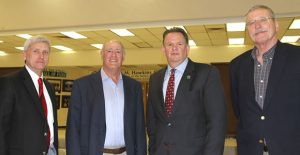State Sen. Kel Seliger (R-Amarillo) gave his insights on this year’s legislative session during a town hall in Clarendon last Wednesday, September 6, at the Bairfield Activity Center.
The senator said this session was one in which a lot of people wanted the state to dictate to local governments.

“It was a session where people came out of the closet and said they didn’t really like local government,” Seliger said. “But they are the same people who don’t like the federal government telling states what to do.”
Seliger drove home this point in talking about proposed property tax reforms that ultimately failed in the regular and special sessions earlier this year. Currently, local governments can raise taxes up to eight percent before triggering a situation where people can petition for a rollback election. But this year Lt. Gov. Dan Patrick and Sen. Paul Bettencourt led a charge to have that power limited to a four percent cap at which point an automatic rollback election would be triggered.
Seliger said this would have created an incentive for local governments to raise their taxes three percent every year just to keep up with the rising cost of doing business.
Donley County Judge John Howard thanked Seliger for a “courageous stand for local control in the face of intense pressure” when it came to tax reform.
The senator responded that counties work to get the most for their money and said “As much as people hate taxes, they hate shortcomings in services from cities or counties more.”
“The state put in independent schools and chartered cities to run themselves,” the senator said. “Smaller government is defined by its closeness to the people. I’ve always held the view that every election is a rollback election, a tax election, and a recall election.”
He also restated his position that voter participation has a direct bearing on the kind of government that exists.
“We have the government we deserve,” he said.
Seliger praised community colleges and Clarendon College in particular.
“Community colleges will make the biggest difference,” Seliger said. “Community colleges are a big driver in higher education. Clarendon College is on the cutting edge of a lot of things like its partnership with Texas Tech University and getting nurses educated for a fraction of the cost.”
Clarendon College President Robert Riza complimented the senator for his stand on tax reform and also for his work on behalf of community colleges.
Seliger said the state’s budget is a conservative one and is generally down in expenditures although certain line items where increased.
“We increased base funding for community colleges,” he said. “At Clarendon College it was $300,000 more for core operations.”
Other areas of increase included funds for Child Protective Services, and $300 million from the Rainy Day Fund to help overhaul state hospitals, $350 million for retired teachers’ insurance, and more money for border security.
Seliger said legislators approved $26 billion for public schools and that it should have been higher.
“The [funding] system was built in 1993 and is no longer functioning,” he said.
Seliger said reductions in state funds for public education just means more money has to be spent locally. He also seemed skeptical of a new commission charged with examining public education funding.
“Difficult to cut funds while trying to improve schools,” Seliger said. “If [the commission’s recommendation] is just to squeeze districts more, I’m not going to support it.”
Addressing hot button issues, the senator said the push for unlicensed “constitutional carry” of firearms didn’t get traction in the session because the checks in place are working in Texas. He also said he supported a “school choice” bill that would have let people use public funds for private schools to treat dyslexia and other disorders but the bill died.
Seliger called the “bathroom bill” very controversial. The bill would have required people to use the public restroom associated with the gender on their birth certificates, but it exempted certain public bathrooms because of businesses raised concerns about economic impact. Seliger downplayed the issue as a whole.
“Police chiefs and sheriffs don’t report that clothing choice impacts sexual assaults,” the senator said. “Parents and schools do what it takes to make kids comfortable. Schools have handled this for years.”
Seliger also called for greater legislative oversight of state transportation spending and said medical marijuana has not become a big issue in Texas because doctors are not clamoring to have it legalized.


Leave a Reply
You must be logged in to post a comment.